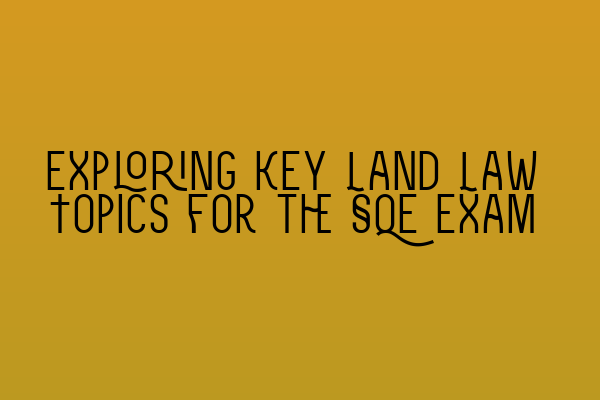Exploring Key Land Law Topics for the SQE Exam
Preparing for the Solicitors Qualifying Exam (SQE) can be a daunting task, especially when it comes to the complex subject of Land Law. As a solicitor, having a solid understanding of Land Law is crucial, as it forms the basis of many legal transactions and disputes involving real property. In this blog post, we will explore some of the key Land Law topics that are likely to be tested in the SQE Exam, helping you to effectively prepare and succeed in this important examination.
1. Freehold vs. Leasehold
One fundamental concept in Land Law is the distinction between freehold and leasehold estates. Understanding the differences between these two types of ownership is vital, as it will dictate the rights and responsibilities of the parties involved.
For a comprehensive explanation of freehold and leasehold estates, check out our related article: Freehold vs. Leasehold. It covers everything you need to know about the characteristics, benefits, and limitations of each type of ownership.
2. Registered vs. Unregistered Land
Another important aspect of Land Law is the differentiation between registered and unregistered land. The Land Registration Act 2002 brought significant changes to land registration processes and requirements, making it essential for solicitors to understand the implications of dealing with each type of land.
To gain a deeper understanding of registered and unregistered land, we recommend reading our comprehensive article: Registered vs. Unregistered Land. This article explores the advantages, disadvantages, and key considerations when dealing with both registered and unregistered land.
3. Easements
Easements are rights that one landowner has over another’s land. These rights can include access, drainage, or the right to receive light. Understanding the nature and characteristics of easements is crucial in Land Law, as they have significant implications for property owners and their use of land.
If you want to explore easements in more detail, make sure to read our related article: Easements. It provides a comprehensive overview of the legal principles surrounding easements, including their creation, termination, and enforcement.
4. Adverse Possession
Adverse possession refers to the acquisition of property rights by occupying someone else’s land without permission and continuously for a specified period of time. This concept has long been a contentious issue in Land Law, and it is a topic that is frequently examined in the SQE Exam.
To delve deeper into adverse possession, we recommend reading our article on the subject: Adverse Possession. This article explains the legal requirements for adverse possession, the implications for both parties involved, and recent developments in case law.
5. Co-ownership and Trusts of Land
Co-ownership and trusts of land are important topics in Land Law, particularly when it comes to determining the respective rights and obligations of co-owners, and the circumstances under which a trust of land may arise.
If you want to gain a deeper understanding of co-ownership and trusts of land, we recommend reading our comprehensive article on the subject: Co-ownership and Trusts of Land. This article outlines the different types of co-ownership, the creation and termination of trusts of land, and the impact of co-ownership on property transactions.
Conclusion
Land Law is a complex subject that requires a comprehensive understanding, especially for aspiring solicitors preparing for the SQE Exam. By exploring the key topics discussed in this blog post, such as freehold vs. leasehold, registered vs. unregistered land, easements, adverse possession, and co-ownership and trusts of land, you will be well-prepared to tackle Land Law questions on the SQE Exam.
For additional practice and preparation resources, be sure to check out our related articles:
- SQE 1 Practice Exam Questions
- SQE 1 Practice Mocks FLK1 FLK2
- SQE 2 Preparation Courses
- SQE 1 Preparation Courses
- SRA SQE Exam Dates
Remember, the key to success in the SQE Exam is thorough preparation and a deep understanding of the core Land Law principles and concepts. Good luck!
